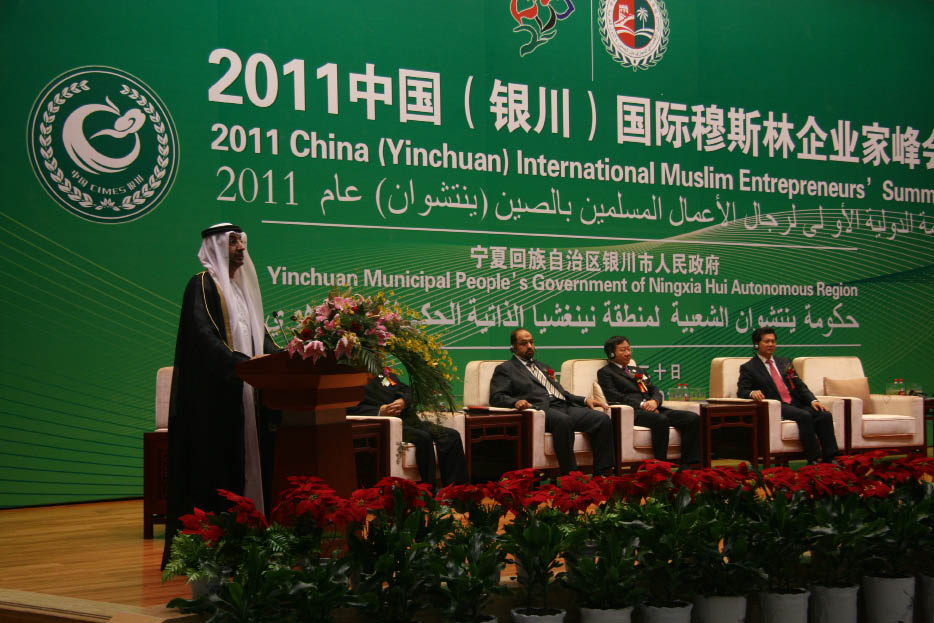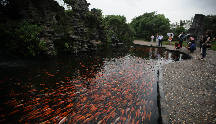The Second China-Arab States Economic and Trade Forum: A Fruitful Event
The Second China-Arab States Economic and Trade Forum:
A Fruitful Event
– An Exclusive Interview with Wang Zhengwei, Chairman of Ningxia Hui Autonomous Region
By staff reporters TANG HONG & ZHANG HONG
OVER 2,000 years ago, the Old Silk Road linked the Chinese civilization and the Arab civilization. The ancient transcontinental road, once echoing with the clanking of the bells of camels carrying bolts of silk and other goods, began the history of trade and cultural exchange between China and the Arab world. Now, the China-Arab States Economic and Trade Forum has established a new platform for exchanges between the two sides and accelerated Ningxia's opening to the countries west of it.
|
 |
| Wang Zhengwei (first from right) at the opening ceremony. |
The Second China-Arab States Economic and Trade Forum, held from September 21 to 23, 2011 in Yinchuan, capital city of northwest China's Ningxia Hui Autonomous Region, attracted officials, enterprises and businessmen from all over the world, aiming to achieve economic cooperation. The forum also brought Ningxia, "the Muslim province of China," into the world's spotlight. As a pivotal region connecting China and the Arab world, Ningxia is posed to deepen its hinterland opening strategy further via the China-Arab States Economic and Trade Forum. China Today gained the opportunity to have an exclusive interview with Wang Zhengwei, chairman of the People's Government of Ningxia Hui Autonomous Region, who told us about the economic and trade forum and the hinterland opening strategy of Ningxia in more detail.
An Important Cooperation Platform
Talking about the significance of the forum on China's diplomatic strategy and foreign trade, Wang explained how this kind of forum is an important strategic measure taken by China to strengthen multilateral cooperation with Arab states in a wide range of fields.
Ningxia held the China-Arab Forum in 2004, which was then called the China-Arab Cooperation Forum. Since then, economic exchanges between China and Arab states have deepened and helped fuel China's development. Based on the framework of the China-Arab Cooperation Forum, in 2010 the State Council approved Ningxia to host the China-Arab States Economic and Trade Forum.
Wang said that the China-Arab Cooperation Forum was more macroscopic in nature, while the China-Arab States Economic and Trade Forum is more specific and pragmatic, focusing more on industrial development of trade, culture and tourism, and specific cooperative projects.
The China-Arab States Economic and Trade Forum, co-sponsored by the Ministry of Commerce, the China Council for the Promotion of International Trade and the People's Government of Ningxia Hui Autonomous Region, has built an important platform for cooperation between China, Arab states and beyond. The two sessions of the forum, held in 2010 and 2011, have proved the significance of the forum.
Ningxia is the sole Hui autonomous region in China and has obvious political, cultural and industrial advantages. Historically, the Hui people in Ningxia were good at doing business. Ningxia and some other regions in western China were important nodes on the Old Silk Road over 2,000 years ago. The China-Arab States Economic and Trade Forum is of strategic and far-reaching significance for China to integrate the resources of the west and stimulate the development of Northwest China, including Xinjiang, Gansu, Qinghai and Ningxia.
Recently, the State Council approved Yinchuan as the permanent host city of the China-Arab States Economic and Trade Forum. Wang said the central government has shown its determination to make the forum an annual event, not just taking it as an expedient practice.
Services
Economy
- Eco-agriculture and Eco-tourism Power Nanchang’s Green Development
- Balance Environmental Protection and Economic Prosperity – Nanchang Looks to European Technology for Green Development
- Sustainable Growth Requires Wiser Energy Use
- Chinese Economy: On the Path of Scientific Development
- China's Economy over the Last Ten Years

